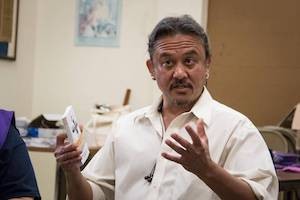A conversation with Ananda Lee Tan of the the Just Transition Alliance, Indigenous Food & Freedom School, and many other projects and organizations.
Friday, April 29th at 8 pm US Eastern Daylight Time.
Register Here: https://givebutter.com/AnandaLeeISE
 Since the signing of the Paris Agreement in 2015, climate and earth system scientists have released numerous reports suggesting that the Paris targets are receding out of reach. While their language may be cautious, it is increasingly clear that capitalism is the fundamental driver of climate catastrophe and ecological breakdown. Instead of holding global warming to the internationally agreed target of 1.5 degrees Celsius, current policies put the world on track for between 2.5 and 5 degrees warming by the end of the century. Calamities once predicted for 2050 and beyond are already here. With major droughts, forest fires and crop failures on every continent, climate breakdown is a lived reality for millions of people today. As sea levels rise, coastal cities are increasingly vulnerable to inundation, and island nations in Oceania face the literal disappearance of their land, the displacement of their people and the destruction of their cultures.
Since the signing of the Paris Agreement in 2015, climate and earth system scientists have released numerous reports suggesting that the Paris targets are receding out of reach. While their language may be cautious, it is increasingly clear that capitalism is the fundamental driver of climate catastrophe and ecological breakdown. Instead of holding global warming to the internationally agreed target of 1.5 degrees Celsius, current policies put the world on track for between 2.5 and 5 degrees warming by the end of the century. Calamities once predicted for 2050 and beyond are already here. With major droughts, forest fires and crop failures on every continent, climate breakdown is a lived reality for millions of people today. As sea levels rise, coastal cities are increasingly vulnerable to inundation, and island nations in Oceania face the literal disappearance of their land, the displacement of their people and the destruction of their cultures.
Without question, climate change and the sixth extinction event are existential threats, not only to humanity, but to all complex life on our precious planet. Despite our knowledge of these threats, social justice movements have not truly risen to meet the challenge. The question is: why? In this discussion, ISE Racial Justice Project coordinator and Cooperation Jackson founder Kali Akuno will address the need for urgency with one of the leading environmentalists on the North American continent, Ananda Lee Tan.
Ananda Lee Tan has been organizing grassroots movements since 1986 – building coalitions, networks and alliances for land defense, environmental justice, worker rights, energy democracy, food sovereignty, zero waste, climate justice and just transition strategies for community self-determination around the world. Ananda was raised in Santiniketan in South Asia – an intentional community founded in 1901 to align ecological education with liberation struggles to dismantle European colonial rule. Ananda’s early activism included mobilizing anti-war protests, organizing direct action against multinational forestry and mining corporations, and unionizing his fellow tree-planters to advance an ecosystem-based forestry agenda.
Over the last two decades, Ananda has served with groups like Global Alliance for Incinerator Alternatives and Rising Tide North America, supporting communities to fight toxic waste, dirty energy and petrochemical industries, while helping advocacy groups distinguish between corporate climate and energy schemes and authentic community-rooted alternatives. He co-convened the Climate Justice Alliance, a network of frontline communities organizing away from colonial extractivism, and towards local, living, caring and sharing economies. He also convened the leadership teams that mobilized the international People’s Climate March and Building Equity and Alignment for Impact, an initiative aimed at shifting philanthropic resources towards Black, Brown and Indigenous communities on the frontlines of ecological crises.
Today, Ananda lives on unceded Coast Salish territories in the Pacific Northwest, and serves as a trainer, facilitator, strategist and guide for grassroots formations such as the Just Transition Alliance, Indigenous Food & Freedom School, Shaping Change Collaborative, Partners for Collaborative Change and Labor Network for Sustainability

